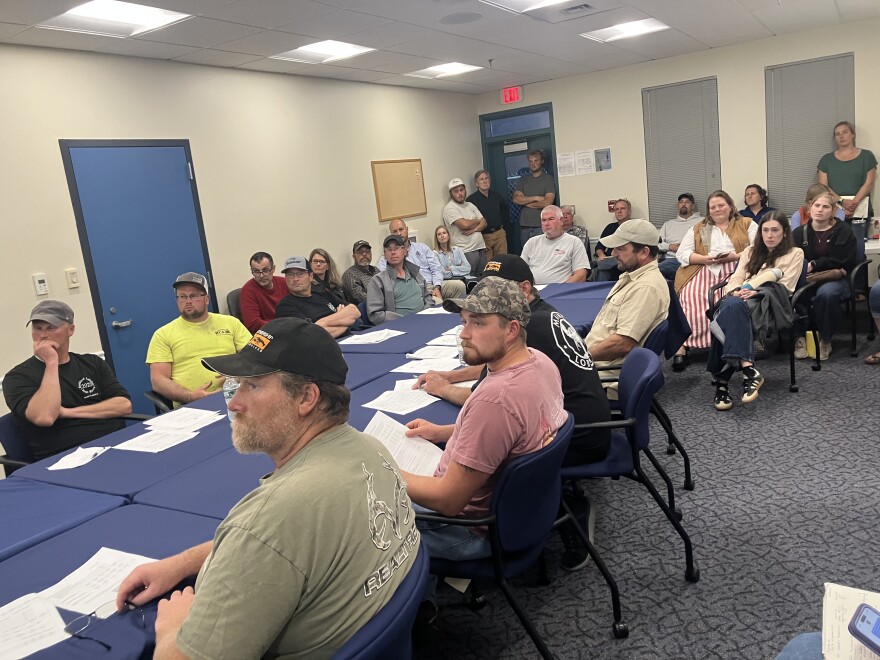This summer, Maine’s Department of Marine Resources surveyed commercial lobstermen on how they feel about and perceive their industry, for the first time since 2008. Results indicate that most lobstermen are concerned more about economics and whale regulations, than the lobster fishery itself.
But as the department shares its findings at Lobster Zone Council meetings up and down the coast, the agency says it is hearing a lot of thoughts and feelings that didn’t show up on paper.
Standing outside the Rockland Ferry Terminal before the Lobster Zone D council meeting Tuesday night, DMR Commissioner Carl Wilson said the idea for the survey was born in the fallout of last winter. That’s when Maine lobstermen vehemently rejected a proposal to increase the minimum legal size of lobsters by 1/16th of an inch, a measure aimed at conserving the population.
Wilson says months of heated public meetings made it clear there’s a pervasive feeling among fishermen that "they weren't being heard. That their thoughts and ideas weren't being incorporated, or that they had things to say, and they just wanted a platform to say them."
After that proposal to change the minimum legal size was repealed this spring, regulators with the Atlantic States Marine Fisheries Commission charged Maine with finding out which conservation measures its commercial fishermen might be willing to support.
"If they were not in favor of this gauge increase, then what?" said Wilson. "The resource is changing. We're several years off our peak abundance and landings. So what are the ideas out there?"
To learn more about what Maine’s lobstermen are thinking and feeling, in July DMR attempted to survey all 4,700 or so commercial license holders. Around 1,400 of them, or about 30%, responded.
About half of those that participated in the survey report that despite the recent declines in landings, they’re fairly optimistic about the future of the industry. About 60% believe the resource itself is stable.
But the survey also underscored their biggest concerns: rising costs for necessities like bait, fuel, gear and boats, and the looming possibility of federal protections for the endangered North Atlantic right whale that could impact the way they fish.
At the Zone D meeting, many of the 20 or so lobstermen present who fish in the midcoast, like Doug McLennan and Ryan Post, stressed how real those threats are, and how intertwined.
"The price of traps, everything, economics is putting a squeeze on everything. Which is why you’ve got guys hauling 800 traps every day, and they’re trying to get all they can in before the guillotine get’s dropped," said McLennan.
"That’s right!" added Post. "And the guillotine, for no reason. It’s a fraud!"
Agency staff also tried to open up discussion on suggestions for protecting lobsters, if future stock assessments indicate more conservation tools are needed. According to the statewide survey, the most popular option was lowering the number of traps allowed per boat — from a maximum of 800 to 600.
But at the Zone D meeting, that idea got some lobstermen’s hackles up, especially younger ones, which frustrated industry veteran and former president of the Maine Lobstermen's Association Dave Cousens.
"You guys are all poo-pooing trap limits like it’s the worst thing you’ve ever heard," said Cousens. "But look at the fishery today. I'm 35% down from the last two or three years. The price is a dollar less. But if you cut your overhead by 25% and you catch the same amount of lobsters in the year, you're ahead of the game, not behind the game."
As DMR staff dove deeper into the data, the gulf between what their survey results show on paper, versus what some midcoast lobstermen actually think and feel about their industry right now, continued to widen.
One younger lobsterman admitted that his responses were impacted by a concern that they would one day be used against him, especially the ones about conservation measures, and he cautioned agency staff to take these results with a grain of salt. Another council member had a more pointed suggestion.
"You should have had one final question. 'Did you understand the survey when you filled it out?'" he said. 'Overwhelmingly [the answer] would have been, 'I do not know.' I had a lot of guys who said, 'I looked at it, I was confused, and it went in the trash.'"
Despite the skepticism and lively debate around the table, there was one thing most Lobster Zone D council members seemed to agree on: that given all the changes on the horizon, DMR should be doing these kinds of industry surveys much more often — and not wait another 17 years.



